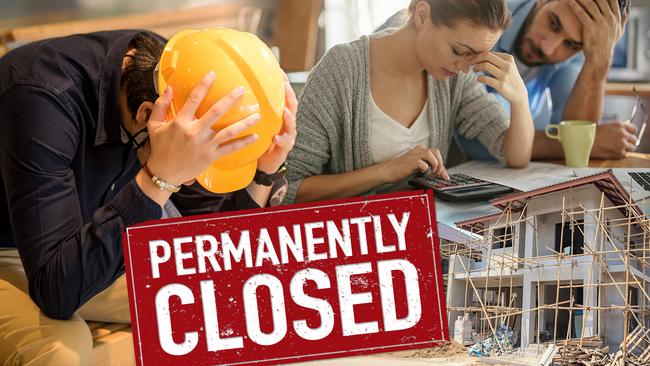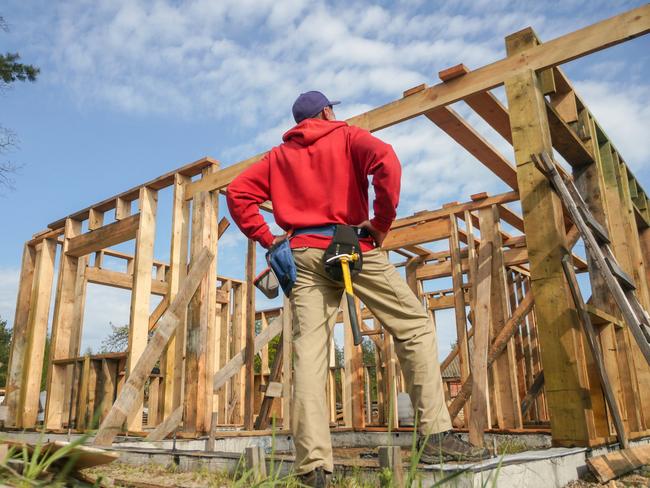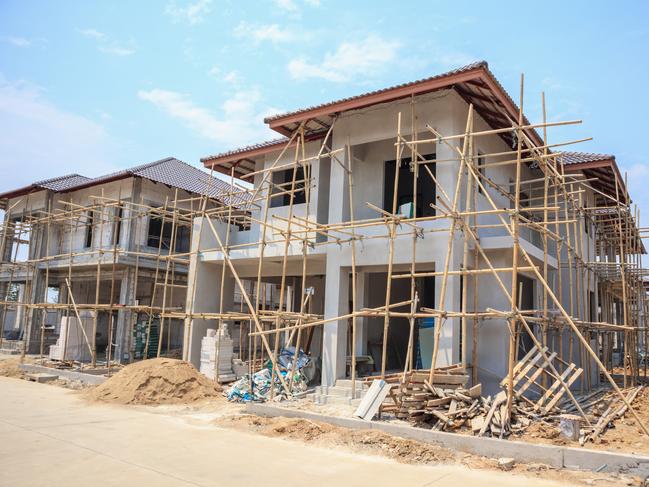The definitive guide of what to do if your builder goes bust
Victorian construction companies have been toppling like dominoes, leaving distressed customers with half built homes and tens of thousands of dollars out of pocket. Here’s the definitive guide of what to do if your builder goes bust.

News
Don't miss out on the headlines from News. Followed categories will be added to My News.
An alarming number of builders are going bust in Victoria, leaving behind half built homes and distressed customers tens of thousands of dollars out of pocket.
The number of Victorian businesses going bust soared by 33 per cent — from 2,144 in 2022-23 to 2,863 in 2023-24 – annual data from ASIC reveals, with construction making up nearly a third of all insolvencies nationally.
While collapsed builders regularly blame the rising costs of materials and labour, homeowners are the ones often left confused and unsure of what to do next.
So here’s the ultimate guide of what to do if your builder goes bust.
What are the key signs your builder is in trouble?
Kapadia and Gordon Lawyers principal lawyer Raynal Kapadia said the number one telltale sign of a builder in trouble was a delay in construction and the pushing of stage progress payments before the completion of prior stages.
“As we have seen with Varaich Homes as well as other countless now defunct builders in the lead up to their eventual liquidation, they began issuing progress payment claims for stages which were incomplete and for stages which were yet to commence,” he said.
“This conduct is not only impermissible according to the usual Master Builders and Housing Industry Association building contracts, but also illegal as it contravenes the Domestic Building Contracts Act.”

He said another common sign that a builder was on the verge of insolvency was if they had failed to pay their tradespersons and suppliers.
“As we saw with Porter Davis, trades became increasingly furious with the builder not paying for their hard work which led them to dismantle their work to send a message to the builder,” he said.
“Although this message is misconceived and could even be considered as criminal conduct, it is a clear indicator that the builder is in financial strife.”
Jirsch Sutherland partner Malcolm Howell said other key signs of financial distress included an unwillingness of the builder to attend site meetings to discuss concerns, not being able to reach your builder by phone or email, and a deterioration in the quality of work or materials.
What happens when my builder becomes insolvent?
Once the builder enters external administration — that is, they have gone bust and can no longer pay their bills — an external administrator will contact all creditors and homeowners.
This first contact will advise them of the appointment and seek details of what debts are owed.
Mr Howell said administrators look to get as much detail as possible on the building project from the homeowner, including copies of the contract, payments made to date, defects, independent assessments of the works undertaken and copies of certificates issued by the building surveyor.
“If you are a creditor you should contact the external administrator and lodge a proof of debt,” he said.
“Homeowners are also within their rights to contact the external administrator to provide any information for their investigations.”
Mr Howell said homeowners should contact the relevant insurer to ensure their claims are noted.

Will my half-finished house get built?
The administrator will undertake an assessment of the building project and determine what works have been completed and how much the remaining construction will cost.
“This will determine if there is a profit in the job and whether the contract can be sold to another builder for completion,” Mr Howell said.
“The homeowner will need to consent to another builder undertaking the remaining works and in some cases consent to a variation in the contract price.
“The insurer may also be involved in these discussions.”
For example, Grant Thornton liquidators confirmed in 2023 that Nostra Property Group had entered into an agreement to complete up to 375 unfinished Porter Davis properties.
They said at the time that Nostra would complete up to 375 townhouses, 169 of which hadn’t been started, as well as offer ongoing employment to 16 Porter Davis staff.
What can you claim on insurance?
Builders in Victoria must purchase domestic building insurance — previously known as builders warranty insurance — on behalf of homeowners for builds with a contract price of more than $16,000.
This must be done before any money is paid or any work is carried out.
Homeowners can then lodge a claim if their builder goes into liquidation, dies or disappears.
A claim must be lodged within 180 days of becoming aware of the builder’s insolvency
Claims are limited to a maximum of $300,000 to fix structural works for a period of up to six years, with incomplete works capped at 20 per cent of the total contract price.
Most builders in Victoria take out this insurance through the Victorian Managed Insurance Authority (VMIA).

The VMIA received 3,679 domestic building insurance claims in the 2023-24 financial year, and resolved a record 5,100 claims.
This is compared to the previous financial year, when the VMIA received 4,457 claims – many from the collapse of Porter Davis in March 2023.
Should you engage a lawyer?
Mr Kapadia said concerned customers should seek legal advice early.
“Any time a person sees their builder becoming difficult to contact or seeking payment for stages which are incomplete or yet to commence they should not delay in getting detailed and specific advice for their circumstances,” he said.
“Getting legal help early can ensure that the owner’s rights are safeguarded, and if need be, court action can be taken promptly.
“Moving quickly can in many cases save the owner thousands.”
Mr Kapadia said building contracts should be reviewed and explained by a lawyer before signing, to ensure the builder had not slipped in any unusual terms.
“A building contract just like any other document a person signs, needs to be read and fully understood,” he said.
“Even if the builder hasn’t included any unusual terms, we find that owners are at times caught off guard by many of the clauses in the contract.
“For example the requirement in many contracts on owners to show capacity for payment to the builder for not just the next stage but the entirety of the project to completion.”
Who else can help?
Consumer Affairs Victoria also offer free advice on an individual’s rights and responsibilities when building or renovating.
They have a Building Information Line on 1300‑55‑75‑59 between 9am and 5pm on weekdays.




